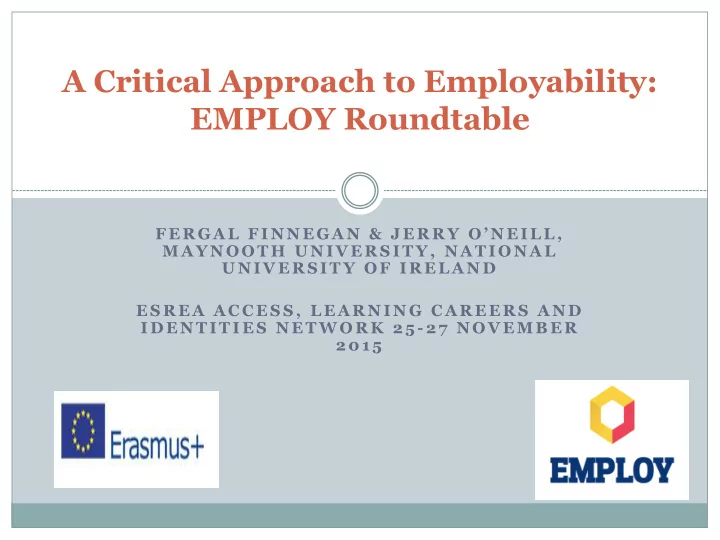

A Critical Approach to Employability: EMPLOY Roundtable F E R G A L F I N N E G A N & J E R R Y O ’ N E I L L , M A Y N O O T H U N I V E R S I T Y , N A T I O N A L U N I V E R S I T Y O F I R E L A N D E S R E A A C C E S S , L E A R N I N G C A R E E R S A N D I D E N T I T I E S N E T W O R K 2 5 - 2 7 N O V E M B E R 2 0 1 5
Building a critical theory Concern with human flourishing. 1. Flourishing depends on the expansion of social freedom (Freire 2. 1998; Honneth, 2014). Identifying unwanted determinations, unmet needs and sources 3. of unnecessary suffering (Bhaskar, 1979; Wright, 2010). Exploration of prefigurative practices now and possibilities in the 4. future (Bloch, 1985; Wainwright, 2011) Concepts which allow us to “leap beyond the familiar” (Barnett, 5. 2013, p. 15). Normative critique is necessary but it is not sufficient. Theory 6. needs to emerge through exploration of complex and layered nature of human experience. Focus on interplay of agency and structure. Aim for explanatory depth as well as emancipatory intent. 7. With people not about people 8.
What is in a word? Raymond Williams (1983, p.15) highlighted the power of “significant, binding words” and what we can learn by tracing continuities and shifts in meaning of keywords.
Employability as policy keyword Increasing importance in Irish policy. Surfacing in media articles and political discourse. Linked to longer history in HR literature and transnational organisations (McQuaid & Lindsay, 2005). Commonplace but elusive – “a way of reasoning that seems to have no structural roots, no social locations and no origin” (Fejes, 2010, p. 91). Response to crisis Above an invitation to think about education, work and society is specific way.
A particular line of vision with blindspots? Little known about what actually happens to non- traditional graduates in Irish labour market Limits of education as ‘fix’ for social problems. Need theeoretical resources which allow us to explore the relationship between new and old inequalities (polarisation in occupations, wealth etc.) but most versions of employability simply overlook this.
The politics of work, self-development and education
Ea EMPLOY – Enhancing the Employability of Non-Traditional Students in HE No. 2014-1-UK01-KA203-001842-TP
Allais, S. (2014) Selling out education: National Qualifications Frameworks and the neglect of knowledge . Rotterdam: Sense. Apple, M. (2013) Can education change society? Milton Park, Oxon; New York: Routledge. Baker, J., Lynch, K., Cantillon, S. & Walsh, J. (2009). Equality: from theory to action (2nd ed.). Basingstoke: Palgrave Macmillan Ball, S. J. (2007). Education plc: understanding private sector participation in public sector education . London: Routledge. Barnett, R. (2013) Imagining the university . Abingdon; Oxon: Routledge. Bhaskar, R. (1979). The possibility of naturalism: a philosophical critique of the contemporary human sciences . Atlantic Highlands, N.J: Humanities Press. Biesta, G. (2010) Good education in an age of measurement: Ethics, politics and democracy. Boulder; CO: Paradigm. Douzinas, C.(2013) Philosophy and resistance in the crisis . Cambridge: Polity Eley, G. (2002). Forging democracy: the history of the left in Europe, 1850-2000 . Oxford: Oxford University Press Fejes, F. (2010) Discourses on Employability: Constituting the Responsible Citizen, 2010, Studies in Continuing Education , (32), 2, 89-102. Freire, P. (1998). Pedagogy of freedom: ethics, democracy, and civic courage . Lanham: Rowman & Littlefield. Honneth, A. (2014). Freedom’s Right. Manchester: Polity. Held, D. (1996) Models of democracy, 2 nd edn, Cambridge: Polity Kittay, E.F. (1999) Love’s labour: essays on women, equality and dependency. London, New York: Routledge. McQuaid, R. & Lindsay, C. (2005) The concept of employability. Urban Studies 42 (2) 197-219 Sayer, A. (2015) Why we can’t afford the rich. Bristol: Policy Press. Sen, A. (1999). Development as freedom . Oxford: Oxford University Press. Vandeberghe, F. (2014) What is critical about critical realism? Milton Park, Oxon; New York: Routledge. Williams, R. (1990). What I came to say . London: Radius Hutchin Williams, R. (1992).Keywords. London: Fontana. Wright, E. O. (2010). Envisioning real utopias . London; New York: Verso.
Recommend
More recommend